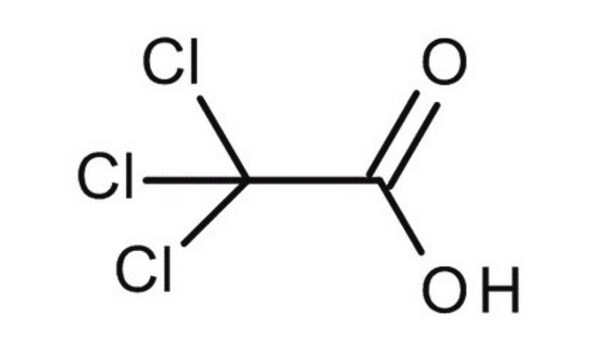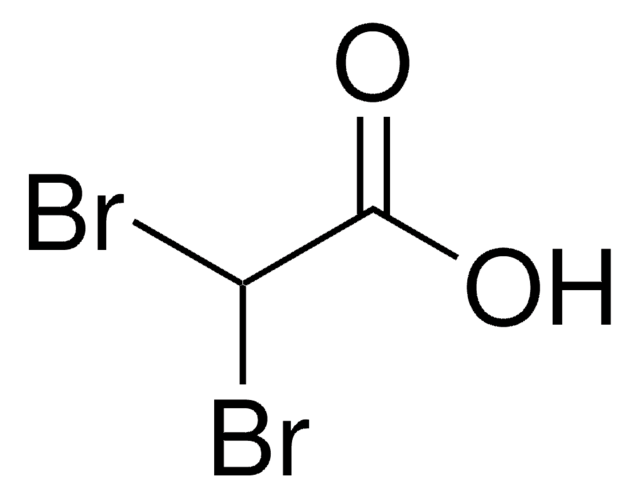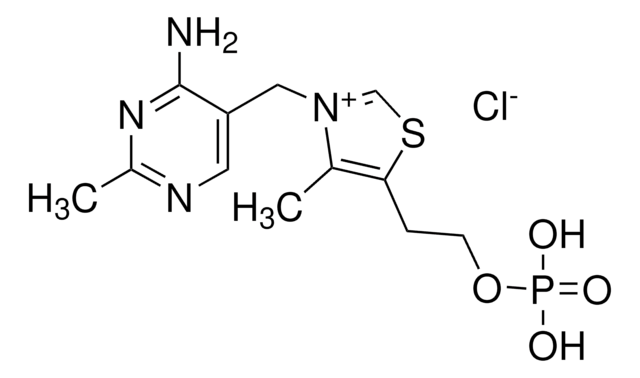91228
Trichloroacetic acid
BioUltra, ≥99.5% (T)
Synonym(s):
TCA
About This Item
Recommended Products
vapor density
<1 (vs air)
Quality Level
vapor pressure
1 mmHg ( 51 °C)
product line
BioUltra
Assay
≥99.5% (T)
form
crystals
flakes
impurities
insoluble matter, passes filter test
ign. residue
≤0.05%
refractive index
n20/D 1.62 (lit.)
pH
<1.0 (25 °C, 0.5 M in H2O)
bp
196 °C (lit.)
mp
54-58 °C (lit.)
solubility
H2O: 0.5 M at 20 °C, clear, colorless
density
1.62 g/mL at 25 °C (lit.)
anion traces
chloride (Cl-): ≤30 mg/kg
nitrate (NO3-): ≤20 mg/kg
phosphate (PO43-): ≤10 mg/kg
sulfate (SO42-): ≤100 mg/kg
cation traces
Al: ≤5 mg/kg
As: ≤0.1 mg/kg
Ba: ≤5 mg/kg
Bi: ≤5 mg/kg
Ca: ≤10 mg/kg
Cd: ≤5 mg/kg
Co: ≤5 mg/kg
Cr: ≤5 mg/kg
Cu: ≤5 mg/kg
Fe: ≤5 mg/kg
K: ≤50 mg/kg
Li: ≤5 mg/kg
Mg: ≤5 mg/kg
Mn: ≤5 mg/kg
Mo: ≤5 mg/kg
Na: ≤50 mg/kg
Ni: ≤5 mg/kg
Pb: ≤5 mg/kg
Sr: ≤5 mg/kg
Zn: ≤5 mg/kg
SMILES string
OC(=O)C(Cl)(Cl)Cl
λ
0.5 M in H2O
UV absorption
λ: 260 nm Amax: 1.60
λ: 280 nm Amax: 0.15
InChI
1S/C2HCl3O2/c3-2(4,5)1(6)7/h(H,6,7)
InChI key
YNJBWRMUSHSURL-UHFFFAOYSA-N
Looking for similar products? Visit Product Comparison Guide
Related Categories
General description
Application
- to determine its effect on avian embryos during an exposure window encompassing cardiac specification
- as a cell fixative
- to terminate the O-acetylserine (thiol)lyase (OASTL) enzymatic assay
- for the precipitation of acidic ribosomal proteins (RPs)
Other Notes
Signal Word
Danger
Hazard Statements
Precautionary Statements
Hazard Classifications
Aquatic Acute 1 - Aquatic Chronic 1 - Eye Dam. 1 - Skin Corr. 1A
Storage Class Code
8B - Non-combustible, corrosive hazardous materials
WGK
WGK 2
Flash Point(F)
235.4 °F - closed cup
Flash Point(C)
> 113 °C - closed cup
Personal Protective Equipment
Regulatory Listings
Regulatory Listings are mainly provided for chemical products. Only limited information can be provided here for non-chemical products. No entry means none of the components are listed. It is the user’s obligation to ensure the safe and legal use of the product.
PDSCL
Deleterious substance
ISHL Indicated Name
Substances Subject to be Indicated Names
ISHL Notified Names
Substances Subject to be Notified Names
JAN Code
91228-100G:4.548173183107E12
91228-500G:4.548173183121E12
91228-1KG:4.548173183114E12
Certificates of Analysis (COA)
Search for Certificates of Analysis (COA) by entering the products Lot/Batch Number. Lot and Batch Numbers can be found on a product’s label following the words ‘Lot’ or ‘Batch’.
Already Own This Product?
Find documentation for the products that you have recently purchased in the Document Library.
Customers Also Viewed
Our team of scientists has experience in all areas of research including Life Science, Material Science, Chemical Synthesis, Chromatography, Analytical and many others.
Contact Technical Service






